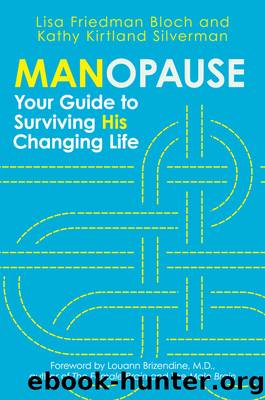Manopause by Lisa Friedman Bloch

Author:Lisa Friedman Bloch
Language: eng
Format: epub
Tags: ebook, book
Publisher: Hay House
Published: 2012-07-18T00:00:00+00:00
No, He Shouldnât
Before we get too carried away, we should let the other side weigh in. While some doctors are impassioned cheerleaders for testosterone therapy, there are many doctors who are adamantly opposed.
They argue that decreasing testosterone isnât a deficiency, it is simply a lower level that is appropriate to a manopause manâs age; that growing older is a stage of life that should be accepted, even relished, instead of being resisted. And to bolster their argument, they suggest that a drop in testosterone levels may be natureâs way of protecting men from the rapid cell growth that can fuel prostate cancer and cardiovascular disease. They also point out that advertisements for testosterone testing and supplementation are underwritten by drug companies, which have a vested interest in their use. Very few doctors argue against giving testosterone therapy to men who are clinically deficient. But a large number feel that for men who are within the normal range for their age or just below it, the jury is still out.
One reason for their doubts is that testosterone levels are quixotic. They can vary with a manâs psychological state. Is he married? Is he single? Does he have children at home or not? Did he win his golf game today? Does he feel as if heâs on top of the competition at work? All of these psychological factors can influence a manâs testosterone levels, on an hourly, daily, or longer-term basis, and this can skew the testing that establishes them.
Hormone studies for men lag behind those for women. There have been a number of small studies over the years that have had different, and confusing, results. But there is yet to be a long-term, placebo-controlled study of testosterone replacement. The National Institutes of Health has created a task force to determine the risks and benefits of testosterone therapy, but that study hasnât yet been completed. However, in 2003, when the Institute of Medicine reviewed evidence from then-current studies, it recommended that treatment was only appropriate for men who produce little or no testosterone until the long-term effects on otherwise healthy men are known.8
While long-term studies may still be lacking, doctors who campaign against testosterone replacement have suggested doubts about its true value. They point to the fact that the small studies that have been done have had confusing, even diametrically opposed, results. And they explain that while testosterone may increase muscle mass, there are doubts as to whether it simultaneously increases strength, makes normal activities easier to perform physically, or lessens the chance of falls and fractures or other health-related concerns. Most telling is the fact that no studies to date have proven that restored testosterone levels will help otherwise healthy men to get healthier or live longer.
Furthermore, while many physicians have put forth extensive anecdotal evidence stating patients are more energetic and contented with treatment, the data is not conclusive. While some men report physical enhancement, including anecdotal evidence of rejuvenated sexuality, boosted morale, and unhappiness being replaced with self-confidence and
Download
This site does not store any files on its server. We only index and link to content provided by other sites. Please contact the content providers to delete copyright contents if any and email us, we'll remove relevant links or contents immediately.
| Hair Loss | Prostate Health |
| Sexual Health & Impotence |
The Ultimate Guide to Fellatio by Violet Blue(1527)
101 Get-Lean Workouts and Strategies by Muscle & Fitness(1509)
The Penis Book by Aaron Spitz(1448)
The Doctors Book of Home Remedies by Prevention Magazine Editors(1245)
The World's Fittest Book: How to train for anything and everything, anywhere and everywhere by Ross Edgley(1180)
The Book of Pook by Pook(1121)
The Ins and Outs of Gay Sex by Stephen E. Goldstone(1063)
The Men's Health Diet by Stephen Perrine(1034)
What to Eat When by Michael Roizen & Michael Crupain & Ted Spiker(1023)
The HIIT Bible by Steve Barrett(1023)
Flat Belly Diet! for Men by Liz Vaccariello(1013)
Anabolics E-Book Edition by Llewellyn William(1000)
The Esquire Guide to Bodyweight Training by Adam Schersten(990)
The Hook Up Handbook: 28 Fundamentals to Keep Her Coming Back for More by Perrotta David(990)
Future Man by Tim Samuels(989)
Younger Next Year by Chris Crowley(975)
Living An Orgasmic Life by Xanet Pailet(972)
The Men's Health Home Workout Bible by Lou Schuler(894)
Dad Bod to Bad Bod: The EXACT Workout and Diet I Followed to Burn Fat and Build Muscle - FAST (Abs, Ab Workouts) by Raza Imam(871)
